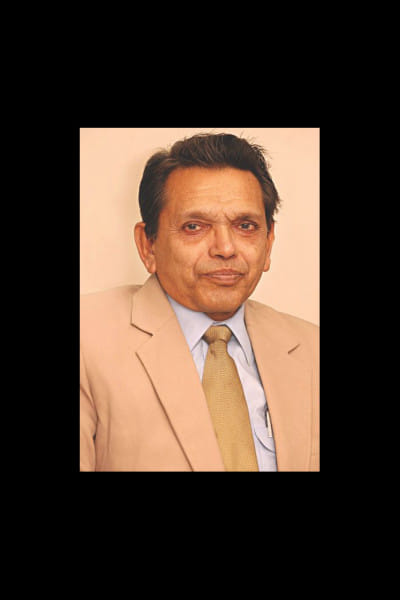Madanda's Niche

The passing away of senior journalist Madan Shahu on May 8, 2016, is a sequel to an event that put a neophyte as an English prose writer. It was February 1995 when Madanda, as the in-charge of the weekend special of the new English newspaper, The Daily Star, kindly published my first article "Death Be Not Proud.".
He, as a matter of benign enquiry, asked me why the journey should begin with death as the subject. I replied with the simplicity of a beginner -- since the world is all about life but it ends in death for all. I chose the subject because it puzzles the mind. He moved on. He also published my write-up, "To sorrow I bade good morrow."
On a personal level, my career in advertising brought me close to Madanda in the late seventies. As a young man back then, I discovered that he was a journalist, a copywriter and a filmmaker with a passion for photography. His deftness in photography amazed me, and one of the candid photos that he took of me is one of my favourites, one that I still treasure.
As I said, Madanda had an aptitude for filmmaking. He scripted the screenplay of the film Bindu Thekey Britto, directed by Rebecca Sultana (Ratri Roy), the first woman film director of the country, which was produced before the Liberation War. He also acted in a bit role in the film Anwara. As a journalist, he worked for The Bangladesh Observer since the 60's, and then moved on to The Daily Star in 1994, which was led by late S.M. Ali.
I observed that he looked at life, its beliefs, its ramifications, and his work from a niche of insularity. He was not prejudiced against any belief, did not behold hatred of any stripe, and had never been a foot soldier of any virulent nationalist credo. One could feel comfortable in his company, without any constricting, testing exchange. I found an emotional shelter in his company.
Madanda carried a grisly emotional wound. His father, late Mahadeb Shahu, was brutally killed by Pakistani occupation forces on June 1, 1971 in Rajshahi. That was his greatest tragedy, and yet, the magnanimity of the man was ennobling. Never did he betray any sort of religious or ethnic rage. Rather, he lamented the indiscretion of local enthusiasm to me. Whenever it came to recalling his father's brutal death, he spoke with restraint, with tears in his eyes. In fact, one can say that Madanda lived the life of Marquez's 'One Hundred Years of Solitude'.
Once I wrote an article titled 'Bad rulers: The bane of the Moslem world'. Madanda would not print it, and he stood his ground. I still believe that most rulers of the Muslim world are not good governors, but Madanda was adamant about not hurting the sentiments of a community.
Madanda spoke fine Urdu. Although he was born in Sirajganj on April 30, 1939, his ancestors came from Uttar Pradash in northern India. When it came to Urdu, Madanda spoke effusively, and had particular liking for the mellifluous ghazals of Talat Mahmood. One of his favourites was, Humse aaya na gaya, tumse bulaya na gaya. When I wrote a piece on Talat's song Sabse Madhur Woh Geet Jo Dard Ke Sur Mein Gaate Hai, reiterating the legend's belief that "our sweetest songs speak of our saddest thoughts," Madanda expressed his approval, stating that he agreed with my sentiment.
A man is known by the love he spreads. Madanda's love of pets, as I saw it, began with his dog Lucky, who was raised inside his second floor apartment. When the dog died, he moved on to cats – he raised a group of about 22 cats in the same quarter; in fact, one of them was blind but that didn't diminish Madanda's love for the creature!
Madanda celebrated his 75th birthday in 2014, enjoying it to the fullest. He was fine! In May 2015, his youngest son got married. And in 2016, within one week of his 77th birthday, Madanda passed away on May 8, 2016. When I visited his house following his demise, seven of his cats were wandering aimlessly, seemingly missing their master.
The sequel to death is scripted from person to person. If death is to be remembered, what better way to do so than to remember how a man lived? Madanda was warm and accessible; he lived in his own little world; a niche of sorts that he had created for himself.
The writer is a regular contributor to The Daily Star.

 For all latest news, follow The Daily Star's Google News channel.
For all latest news, follow The Daily Star's Google News channel. 





Comments